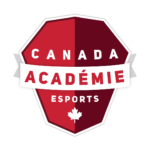Our Esports Day Camps
Registration
Information
Age required: 11 to 17 years old on the day of the activity
Cost: $ 395.00 (+ taxes) (GST / QST eligible for the tax credit – Relevé 24)
Montreal day camps
First week: Monday, July 6, 2020 at 9:00 a.m.
Location: Saint-Laurent Arena
ADDRESS
3715 Saint-Laurent Boulevard
Montreal, QC
H2X 2V7
Sherbrooke day camps
First week: Monday, July 6, 2020 at 9:00 a.m.
Location: College of Mont-Sainte-Anne
ADDRESS
2100 Chemin de Sainte-Catherine,
Sherbrooke, QC
J1N 3V5
Day Camp
This UNIQUE camp allows participants to enjoy the enriching experience of electronic sport during the holidays or spring break!
Our camps, specially designed for students aged 11 to 17, offer participants of all levels the opportunity to improve their performance as well as their training methods!
Each day is:
- 3 hours of mechanical play
- 1h30 of theoretical training
- 1 hour of physical activity
Weekly schedule
Monday to Friday 9 a.m. to 4 p.m.
Dinner from noon to 1 p.m., 2 breaks of 15 minutes per day
MULTIGAME weeks do not have an assigned game and leave the choice to the player to be supervised among competitive eSports games (League of Legends, Fortnite, Overwatch …).
The SPECIALIZED weeks will focus on a particular eSport with expert coaches.
The Montreal camps take place at our MTL Esports facilities, at 3715 Saint-Laurent Boulevard.
The Sherbrooke camps take place at the facilities of Collège Mont-Saint-Anne.
Course content
Course 1: Introduction to the camp
This session is simply used to introduce Academy staff and camp instructions, especially those related to Covid-19. Students are also asked to introduce themselves and state their personal goals for the week.
Course 2: Sleep and physical activity
In this course, we talk about the importance of sleep and physical activity for health. The question is approached from the point of view of performance in the game, that is to say that we demonstrate for example that a well-rested person will perform better than a person who is deprived of sleep.
Course 3: Hydration, cyber addiction and cybercitizenship
The logical continuation of the previous course, this course talks about the importance of hydration for the proper functioning of the body, again approached from a performance perspective. We also do prevention in connection with cyber addiction and discuss cybercitizenship, that is, how to behave during our interactions online.
Course 4: Planning and training methods
This course covers electronic sports training methods, which adhere to the same principles as traditional sports. We discuss the importance of setting goals and equipping yourself with the tools to achieve them, and how to ensure that learning is maximized during each play session by making a conscious effort to improve.
Course 5: Motivation, stress and emotions
This course deals with the more psychological aspects of competition. We first explain why we are stressed during a game session and give tips for dealing with stress and emotions experienced while playing the game (including how to deal with frustration!)
Course 6: Communication in team games
This course discusses issues related to communication in team games. General concepts of communication, such as the risk that the sender’s message will be misinterpreted by the person receiving the communication, are used to identify concrete tips for maximizing communication during team games.
Course 7: Triggers and Decision Making
This course examines decision making in esports, which is often characterized by a large amount of information and very little time to react to it. You learn to use specific triggers that are associated with a pre-planned response to simplify and speed up decision-making at critical moments in a game.
Course 8: The phases of play in esport
In this lesson, we divide the action into three phases that take place in a game, and explain what to consider during each phase. We also look “under the hood” of games by looking at what happens to our character when we enter a command with our controller or keyboard and mouse.
Course 9: Lines of Sight in Video Games
This more technical course explores the practical consequences of interacting with the world of a video game with a camera that is attached to our character (usually right in the middle of his chest!). We explore how what we see from our perspective while playing is different from what our opponents see from our character, and how to take advantage of this asymmetry to gain a competitive advantage.
Course 10: The components of a computer
At the repeated request of students and parents, we have created this course which explains what are the different components of a computer (CPU, graphics card, hard drive, etc.) and how they interact together to enable our favourite game to run on those. The course includes some tips for people who are considering building their own computer.






